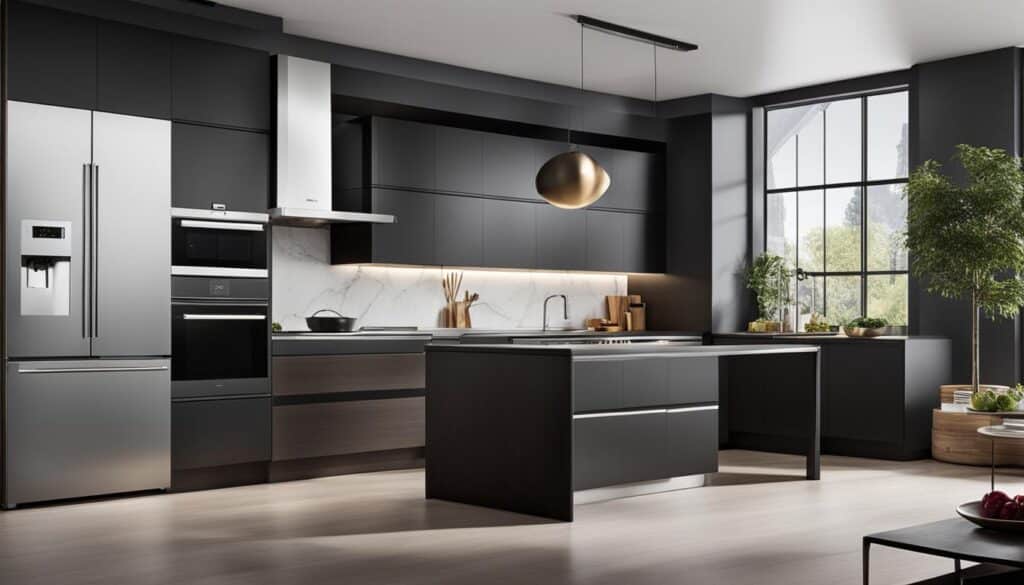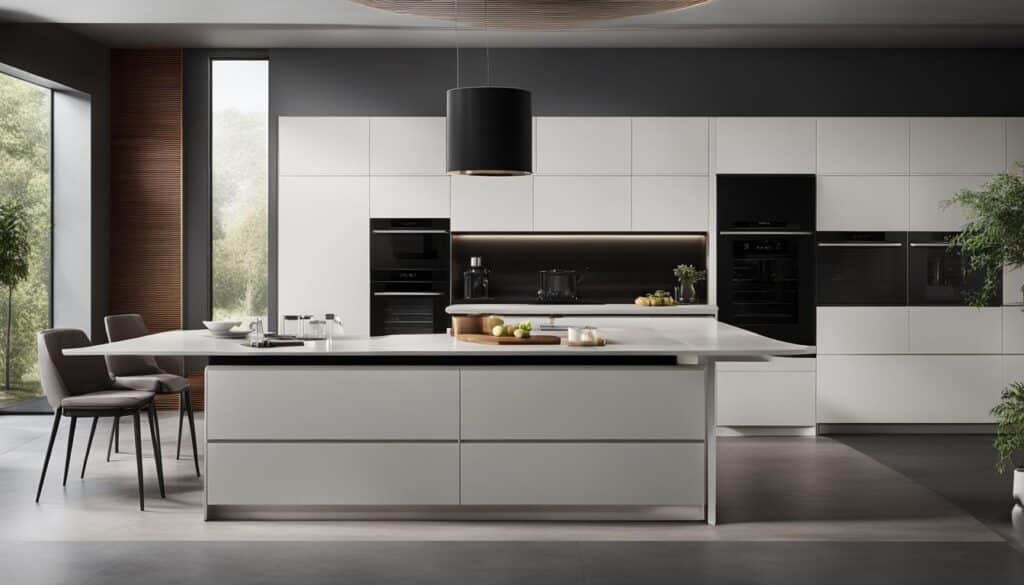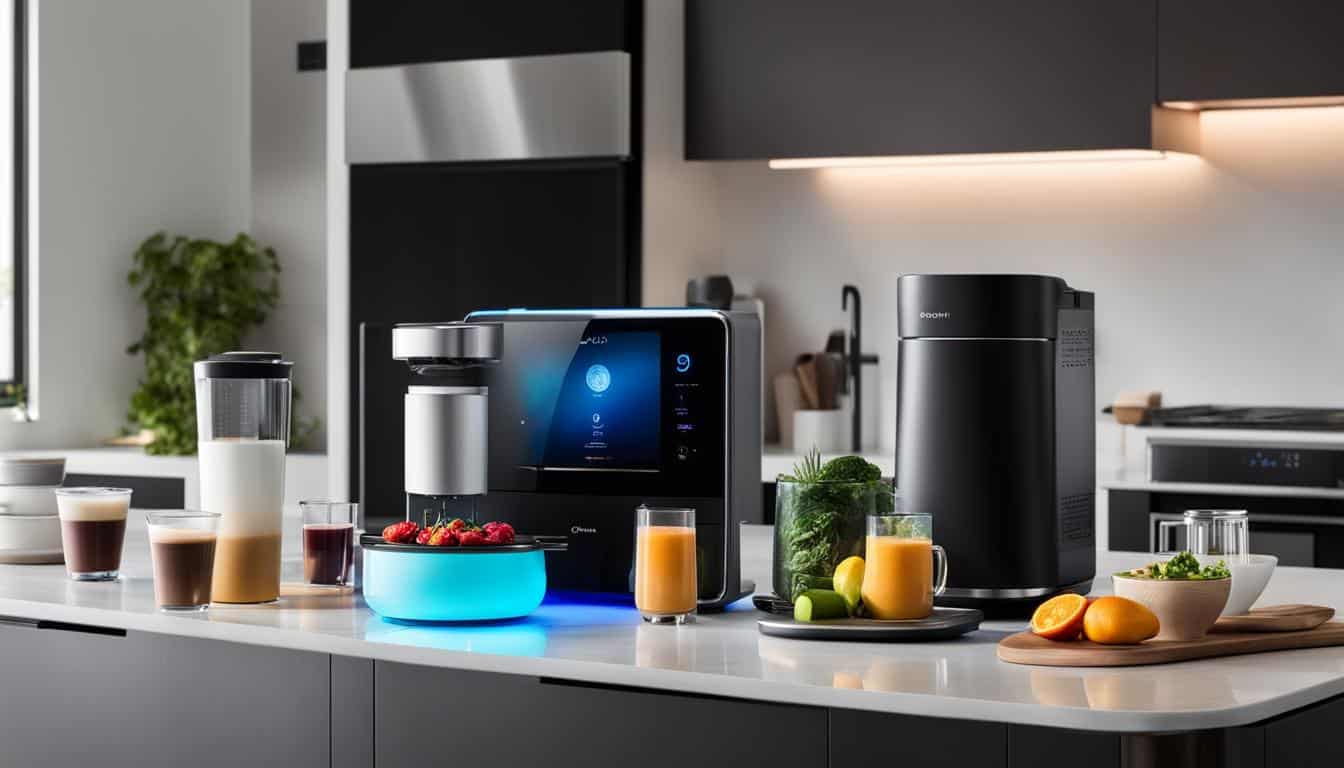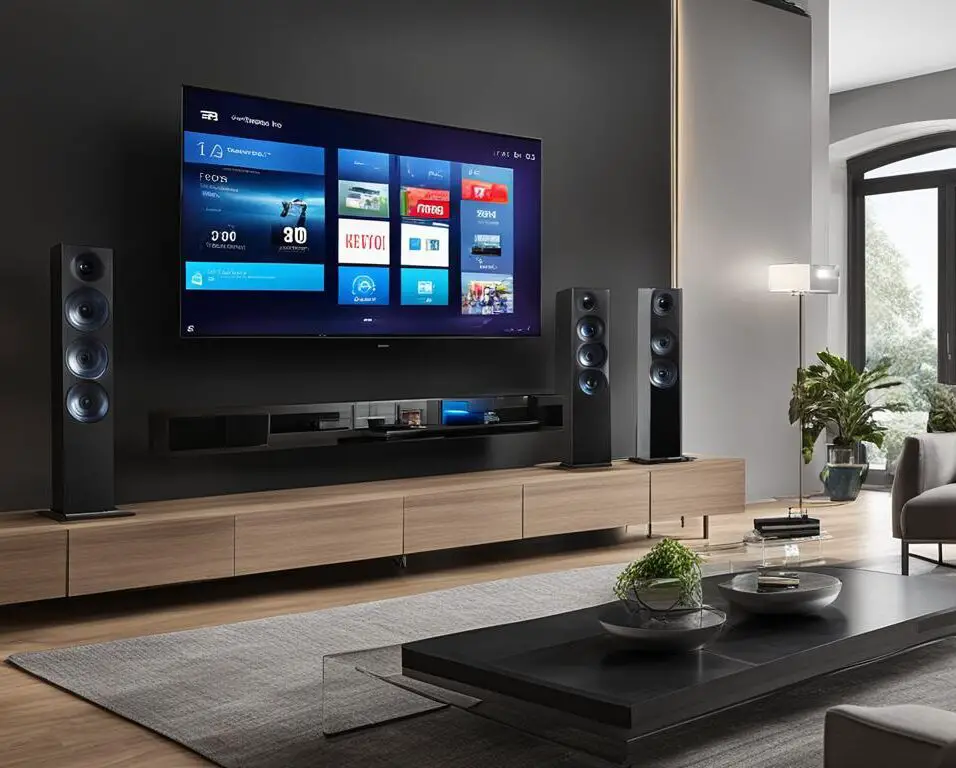Smart Kitchens: Revolutionizing Cooking and Dining
Technological advancements in recent years have transformed various aspects of our lives, including the kitchen. The emergence of smart kitchen appliances and connected devices has revolutionized the way we cook, eat, and interact with our kitchens. The smart kitchen market is rapidly growing, driven by the increasing adoption of Internet of Things (IoT) technology, changing consumer lifestyles, and a focus on convenience, efficiency, and sustainability. The global smart kitchen market is expected to reach USD 15601.65 million by 2028, with a CAGR of 35.38% during the forecast period. Key drivers of this growth include increasing connectivity and IoT integration, enhanced efficiency and convenience, and a focus on sustainability and energy efficiency.
Key Takeaways:
- Smart kitchen technology innovations are transforming the way we cook and dine.
- Smart kitchen gadgets and appliances offer convenience, efficiency, and personalization.
- Innovative kitchen tools enhance the cooking experience and optimize energy consumption.
- The global smart kitchen market is expected to grow significantly in the coming years.
- Connectivity, efficiency, and sustainability are driving the growth of smart kitchens.
Introduction to Smart Kitchen Technology
Smart kitchen technology has revolutionized the way we cook and interact with our kitchens. With the rise of hi-tech kitchen gadgets and smart cooking devices, the cooking experience has become more convenient, precise, and enjoyable. Smart appliances for the kitchen, such as ovens, refrigerators, and coffee makers, offer a range of features that provide control, automation, and connectivity.
One of the key advantages of smart kitchen appliances is the ability to control them remotely through mobile devices. Whether you’re in another room or outside the house, you can easily adjust settings, monitor activities, and even order groceries with just a few taps. This level of convenience and control makes cooking a seamless and efficient process.
The integration of Internet of Things (IoT) technology in smart kitchen devices allows for even more connectivity and automation. IoT devices in the kitchen can be used to control appliances, monitor inventory, and adjust settings. Furthermore, voice-activated devices powered by voice assistants like Amazon Alexa or Google Assistant provide hands-free control and assistance in the kitchen, allowing users to multitask and focus on the cooking process.

In addition to control and convenience, smart kitchen technology offers precise measurements with the help of smart kitchen scales. These scales ensure accurate measurements for cooking and baking, contributing to better results in the kitchen. Automated cooking devices, such as smart cookers and grills, simplify the cooking process by providing pre-set functions and timers, taking the guesswork out of meal preparation.
Advantages of Smart Kitchen Appliances
Smart kitchen devices and appliances have revolutionized the way we cook and interact with our kitchens. These advanced kitchen gadgets offer numerous advantages that enhance convenience, efficiency, and personalization in our cooking and dining experiences.
Convenience and Control
One of the major advantages of smart kitchen appliances is the convenience they provide. These connected devices can be controlled remotely through mobile devices, allowing users to adjust settings, monitor activities, and even order groceries with just a few taps. Imagine being able to preheat your oven or start brewing coffee from bed in the morning! With smart appliances, you have the freedom to control your kitchen from anywhere in your home or even when you’re away.
Energy Efficiency and Sustainability
Smart kitchen appliances are designed with energy efficiency in mind. They optimize settings and adapt to user behavior to save energy and reduce utility bills. For example, smart refrigerators can detect when the door is left open and send alerts to remind users to close it. Smart ovens can adjust temperature and cooking time to minimize energy consumption. By using these connected devices, homeowners can contribute to sustainable living by reducing their carbon footprint and conserving energy resources.
Enhanced Safety and Personalization
Smart kitchen appliances improve safety in the kitchen with innovative features. For instance, smart smoke detectors can alert users of potential fire hazards, ensuring prompt action is taken. Automatic shut-off capabilities also add an extra layer of safety, preventing accidents caused by forgetting to turn off appliances. Additionally, smart appliances offer personalization by learning user preferences and dietary needs. They can provide customized recommendations for recipes, adjust cooking settings based on individual taste preferences, and offer nutritional information for healthier meal choices.
Seamless Integration and Time-Saving Automation
Smart kitchen appliances are designed to seamlessly integrate with other devices and platforms, offering a connected kitchen experience. Integration with voice assistants like Amazon Alexa or Google Assistant allows for hands-free control and assistance in the kitchen. Smart kitchen scales ensure precise measurements for cooking and baking, eliminating the need for multiple measuring tools. Automated cooking devices such as smart cookers and grills simplify the cooking process, allowing users to set timers and monitor progress effortlessly.
Overall, the advantages of smart kitchen appliances are extensive, offering convenience, energy efficiency, safety, personalization, and time-saving automation. As technology continues to evolve, smart kitchen devices will further enhance our cooking experiences and become an integral part of modern kitchens.

Conclusion
Smart kitchen technology innovations have revolutionized the way we cook and dine, bringing convenience, efficiency, and personalization to our kitchens. With the continuous advancement of artificial intelligence and augmented reality, the future of innovative kitchen technology holds tremendous potential for growth and transformation.
The integration of AI in smart kitchens will continually enhance recipe recommendations, ingredient recognition, and cooking techniques. Imagine having a virtual kitchen assistant that guides you step-by-step through the cooking process using augmented reality, making it easier than ever to prepare delicious meals.
Smart kitchen technologies also play a significant role in sustainable food management. By monitoring food freshness, reducing waste, and optimizing energy consumption, these innovations contribute to a more eco-friendly approach to cooking and food preparation.
As smart technology continues to evolve, the kitchen is becoming a hub of innovation. Cooking is no longer a chore but rather a seamless and enjoyable experience with the help of smart kitchen technology. So, embrace the future of cooking and let innovative kitchen technology transform the way you cook and dine!
FAQ
What is smart kitchen technology?
Smart kitchen technology refers to the integration of connected devices and appliances in the kitchen, allowing for remote control, automation, and enhanced convenience in cooking and dining.
What are some examples of smart kitchen appliances?
Smart kitchen appliances include ovens, refrigerators, coffee makers, scales, cookers, grills, and more. These appliances can be controlled remotely through mobile devices and offer features like precise measurements, automation, and personalized settings.
What advantages do smart kitchen appliances offer?
Smart kitchen appliances provide convenience, energy efficiency, improved safety, personalization, time-saving automation, and seamless integration with other devices and platforms.
How does smart kitchen technology contribute to sustainability?
Smart kitchen technology helps in sustainable food management by monitoring food freshness, reducing waste, and optimizing energy consumption. It promotes efficient use of resources and contributes to a more sustainable lifestyle.
What is the future potential of smart kitchens?
The future of smart kitchens holds tremendous potential for growth and innovation. With advancements in artificial intelligence and augmented reality, smart kitchen technology will continually improve recipe recommendations, ingredient recognition, cooking techniques, and enhance the overall cooking experience.
Source Links
- https://fastercapital.com/content/Smart-kitchen–Revolutionize-Your-Cooking-Experience-with-a-Smart-Kitchen.html
- https://medium.com/@alextaffiliatenetwork/how-smart-kitchen-appliances-are-revolutionizing-the-way-we-cook-a42635c7e6c9
- https://www.linkedin.com/pulse/smart-kitchen-market-revolutionizing-culinary-experiences








